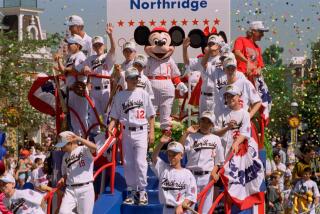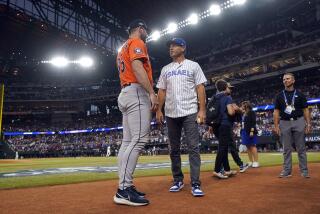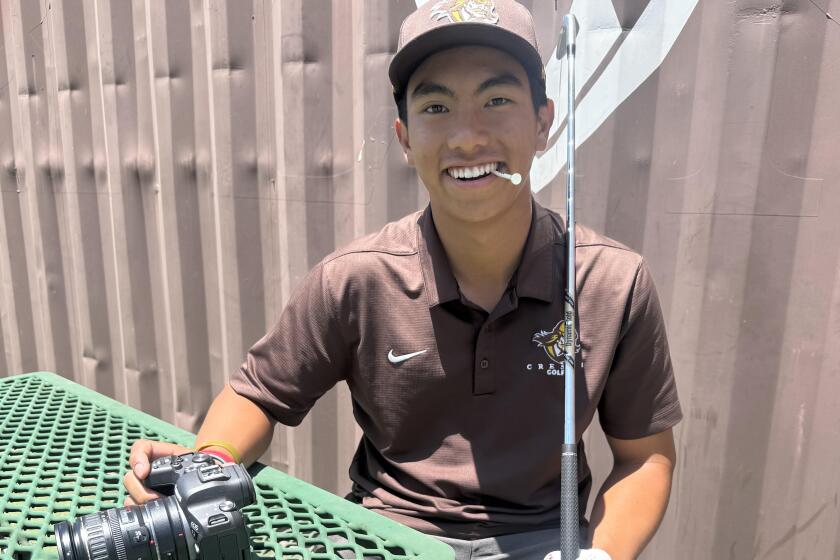Baseball Catches On in Russia
- Share via
MOSCOW — Dmitry Kiselyev remembers when he was dragged to his first byeisbol game here as a child. A friend of his father had been commissioned by the Soviet government in the late 1980s to put together a team to compete in the Olympics.
Kiselyev and his friends were steeped in boxing, good at soccer, whizzes with hockey sticks. But baseball struck him as boring. While the young Russian athletes struggled to catch tennis balls in their cheap mitts, he dozed on the bench. His father’s friend woke him up, put a helmet on his head and a bat in his hand.
“He threw the pitch, I hit the ball, and I understood that I love this game,” said Kiselyev, now 33 and president of what has become a full-fledged professional baseball league, the Russian Baseball Federation.
That America’s summer pastime has found a home in snowy Russia was apparent last week, when two scouts from the Pittsburgh Pirates spent several days in a chilly gymnasium in north Moscow, surveying the home-grown talent and teaching kids reared on ice hockey how to throw curveballs and hit a solid line drive.
“They’re raw,” admitted Adam Souilliard, coach of a Pirate scout team from north central Florida. “They’re raw, talented kids who work their butts off for their coaches, and do exactly what their coaches say. But if this continues to grow, it could be fertile ground.”
For years, major league scouts have been skulking around ballparks in Venezuela, Puerto Rico and the Dominican Republic, luring promising young players with big salaries and a chance to play the game on a big grass field with an impatient crowd and a sassy organ, the air redolent with hot dogs and popcorn and the light breeze of a summer that stretches into October.
Now, with the possibility of an international draft under discussion, scouts are looking farther than Latin America. Improbably, they have reached Russia, where there hasn’t been an Eastern Russian team in the national playoffs for the last three years (the team couldn’t afford tickets to Moscow), where fewer than a dozen fans attend a typical game and where there is only a single dedicated baseball stadium (with artificial turf -- but hey, it’s Moscow, there are no lawns).
Russian recruits have signed with the Dodgers, Angels, Seattle Mariners and Atlanta Braves over the last few years, though none has advanced past the minors. Russian pro coaches, many of whom barely earn $500 a month, are constantly pushing their players. The way they see it, they have about 100 years of catching up to do.
The Khovrino team, named for the north Moscow district in which it is based, runs players all the way up from elementary school to the pro team. At the team gym, it’s the last week of January, and Coach Mikhail Kornev has his two Little League teams of 6- to 12-year-olds practicing three nights a week and on Saturdays. The teenagers and the professional Russian High League players are in the gym six days a week.
“We have big problems competing with hockey, soccer, basketball. The best physically prepared children go into these sports, and we are left with the ones who didn’t make it,” Kornev said.
He lures them with baseball cards, purchased in batches on his occasional visits to the U.S., handed out one by one to the best player at each training session. Mitts, pants, bats and helmets are often donated by American expatriates living in Moscow who come to games and cringe at the equipment the teams are trying to play with.
It works: The team qualified for the international Little League championships three times, in 2001, 2002 and 2003, and won three junior and senior league championships. (The Russian national team placed second in the European Championship in 2001.)
“Of course I have to practice them hard,” Kornev said. “In America, there are so many kids who play baseball. I have 50 people who can play baseball. They have 5 million. They don’t have to train. They can pick the best.”
Kornev puts his boys through their paces, barking commands and threatening various anatomical horrors to youngsters who don’t hold their mitts properly or make smooth, quick throws to first.
They strain to hear words of advice from Souilliard and lead scout Des Hamilton, as if listening harder would make their English more comprehensible.
“Your feet dictate the hand. If your feet are good, your hands’ll be good. Stop, pull back, wind it up,” Hamilton says.
“This guy is 10 times as big as you, and look at him, how quickly he does that!” exclaims one boy as Souilliard prances across the floor in a high-step. “But do you understand what he’s saying?”
“Not a word,” a teammate replies. “I understood ‘ball.’ What did he say?”
“You goat, he said, ‘Run faster.’ ”
“He said, ‘You goat?’ ”
“He didn’t say, ‘You goat.’ I said, ‘You goat.’ ”
After the practice, several said they felt lucky to have the Americans’ help.
“In Russia, nobody knows how to play baseball, almost nobody,” said Kirill Filimonov, 13, who has been playing for four months. “So it’s good the Americans came. They will show us how to do it properly.”
Kornev had the same advantage, almost: He and assistant coach Vladimir Yelchaninov were children together in the Bronx, the children of Russian diplomats who lived in a walled compound. They played baseball with a stick, watching the American boys playing next door through the fence.
They came home to Moscow and went back to hockey and soccer but played catch whenever they happened to get together. Now, they are trying to get Moscow city officials to commit money for new ballfields: Their Little League team plays on a soccer field, and the adult team, when it’s not booked at the main baseball stadium, has to make do at a field used on alternate days for soccer and dog racing.
“You’re talking about baseball, and people are saying things like, ‘What’s America doing in Iraq?’ They say it’s an American game. They don’t want to hear anything about baseball,” Kiselyev said.
By the end of the week, Hamilton said he had seen several prospects for U.S. college teams, or even potential recruits for the Pirates.
“From what I saw, physically, they are hardworking, strong-bodied young men. Their tools just need some polishing, as we say in the business, to move them along,” he said.
“They remind me very much of kids out of Nebraska, or Kansas, or the Dakotas: not very polished, but willing to learn. They haven’t played the game enough to develop bad habits.”
Tim Byrd, a communications supervisor at the U.S. Embassy, has bought uniforms, balls and gloves for the Khovrino team, after it became clear they wouldn’t be able to get them any other way.
“You have to hand it to these kids, some of them come out here with literally no ability, and they have stuck it out. Just stuck it out. They never give up,” Byrd said.
His own 10-year-old son joined the Russian team when the family moved to Moscow. Communication, he said, wasn’t an issue.
“The bottom line is, you give a kid a ball, and they speak the same language,” he said.
More to Read
Go beyond the scoreboard
Get the latest on L.A.'s teams in the daily Sports Report newsletter.
You may occasionally receive promotional content from the Los Angeles Times.










